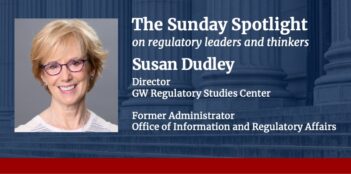Reviving FTC Rulemaking
Attorney calls for consumer protection agency to increase the use of its authority to issue regulations.
Reforming the Exchange Visitor Program for Au Pairs
The U.S. Department of State seeks to increase wages and improve labor protections for au pairs.
Is the SEC Hiding in Plain Sight?
Scholar claims that the SEC’s 2022 whistleblower report to Congress was the least transparent in history.
Reversing Trump-Era Changes to Immigration Court Proceedings
U.S. immigration office proposes a rule to address problems with the immigration court system.
Reforming U.S. Visa Programs for Foreign Workers
U.S. immigration agency proposes new rule to address problems with temporary work visas.
Promoting Best Practices for U.S. Regulatory Analysis
Benefit-cost analysis experts advocate changes to a draft update of OMB Circular A-4.
Risk Identification in AI Regulation
Daniel Ho discusses the importance of identifying emerging risks for effective artificial intelligence regulation.
Business Intimidation in the Rulemaking Process
Scholars reveal how businesses lobbying can intimidate agencies and influence rulemaking.
Maintaining the Durability of Regulatory Analysis
Susan Dudley, former OIRA Administrator, discusses proposed changes to federal guidelines for regulatory impact analysis.
Online Processes in Agency Adjudication
Agencies can improve their adjudicatory processes by broadening access to their electronic case management systems.
Improving Virtual Public Engagement
A new series of recommendations from ACUS will help agencies improve their use of virtual engagement in rulemakings.
Artificial Intelligence for Retrospective Regulatory Review
Artificial intelligence can help agencies review and improve their existing regulations.












